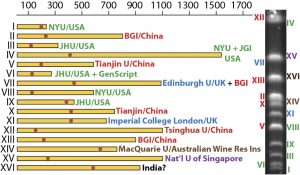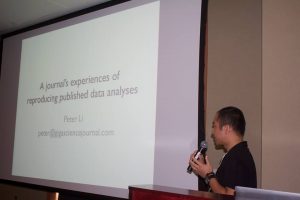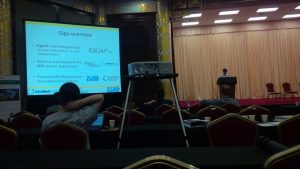GigaBlog


Sam Minot from Signature Science, LLC and Andy Kilianski from the Edgewood Chemical Biological Center are part of a team that has been trialling a new palm-sized DNA sequencer to test whether it can characterize viruses and bacteria.
Open Science has emerged into the mainstream, primarily due to concerted efforts from various individuals, institutions, and initiatives. This small, focused gathering brought together several of those community leaders. The purpose of the meeting was to define common goals, discuss common challenges, and coordinate on common efforts.

Following our efforts promoting open science and “community genomics” projects such as the “Peoples Parrot” ** and Azolla “crowdfernded” genome , today we have a guest posting from Peng Jiang and Hui Guo at the University of Georgia covering their crowdfunding efforts to** sequence the first Cactus genome . While

The software application PLINK is one of the most widely used tools in bioinformatics, particularly for genome-wide association studies (GWAS) that look at genetic variants in different individuals to see if any variant is associated with a trait. With the advent of the thousand dollar genome, the computational demands being made on such programs are exploding.

Tītitipounamu, Rifleman, female (left) and male (right) Our New Zealand based Commissioning Editor, Nicole Nogoy, was asked by Creative Commons Aotearoa (New Zealand) to write a guest blog on open licensing from a Kiwi perspective. Being big users and fans of their licenses we were happy to oblige.

*The field of synthetic biology, designing and building engineered biological systems through DNA synthesis and genetic engineering, is rapidly moving to a genome scale. In a similar trajectory to genomic sequencing and genome projects two decades ago, it has moved from engineering single genes, entire synthetic bacterial genomes (J Craig Venter’s notorious “Synthia”), to the eukaryotic organism stage.

Following from his guest blog in October on “Approaches and resources to slow the spread of infection”, Michael Dean from the Center of Cancer Research at the NIH uses his data oriented approach to give an update of where the Ebola epidemic is. While there may be less media coverage (apart from in the UK), this doesn’t relate to the situation on the ground.

In the long history of humankind (and animal kind too) those who learned to collaborate and improvise most effectively have prevailed.

When it comes to technology, GigaScience has always been open and willing to embrace new ways of integrating technology in its publishing processes, with the ultimate goal of working towards more reproducible, interactive and executable papers.
